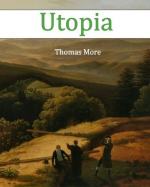|
This section contains 5,397 words (approx. 18 pages at 300 words per page) |

|
SOURCE: "Thomas More's Enclosed Garden: Utopia and Renaissance Humanism," in English Literary Renaissance, Vol. 6, 1976, pp. 140-55.
In the essay that follows, Rebhorn investigates the parallels between More's Utopia and Renaissance humanist ideals, exploring how the Utopia draws upon and extends humanist agricultural metaphors associated with education and social improvement.
Thomas More has generally been paired with Erasmus as one of the leading representatives of Renaissance humanism, and his Utopia has been widely read as a provocative expression of humanist ideals. With the works of fifteenth-century humanist educators like Vittorino da Feltre and Aeneas Silvius and of contemporaries like Erasmus, the book shares certain fundamental doctrines: a faith in man's educability; a conviction of his potential goodness, rationality, and willingness to cooperate with his fellows; and a belief in social planning and the transformation of social institutions as the best means both to improve society as a whole and...
|
This section contains 5,397 words (approx. 18 pages at 300 words per page) |

|


